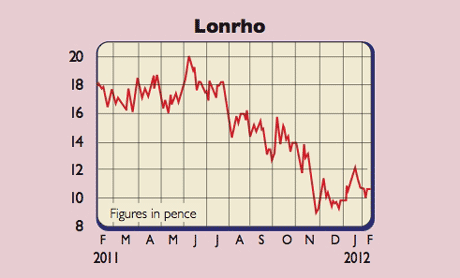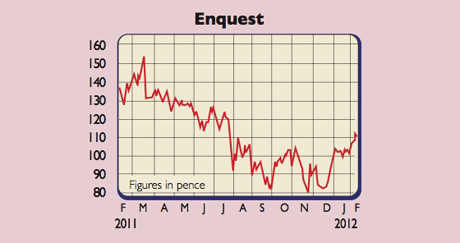Get the latest financial news, insights and expert analysis from our award-winning MoneyWeek team, to help you understand what really matters when it comes to your finances.
You are now subscribed
Your newsletter sign-up was successful
Want to add more newsletters?

Twice daily
MoneyWeek
Get the latest financial news, insights and expert analysis from our award-winning MoneyWeek team, to help you understand what really matters when it comes to your finances.

Four times a week
Look After My Bills
Sign up to our free money-saving newsletter, filled with the latest news and expert advice to help you find the best tips and deals for managing your bills. Start saving today!
Which three countries are set to expand the fastest in 2012? The first two on the International Monetary Fund's list China (8.2% growth) and India (7%) won't surprise many investors. But the third one might it's sub-Saharan Africa at 5.5%. That puts it way ahead of Brazil (3%), Russia (3.3%) and well above a global average of 3.3%.
This is because Africa has an abundance of natural resources oil and gas, gold, base and precious metals, diamonds which are relatively cheap to extract and sell to boost GDP. The Arab Spring in Egypt, Libya and Tunisia has rocked output in the north of Africa. But further south it hasn't had much impact.
1. Lonrho (LSE: LONR), rated a BUY by Daniel Stewart
MoneyWeek
Subscribe to MoneyWeek today and get your first six magazine issues absolutely FREE

Sign up to Money Morning
Don't miss the latest investment and personal finances news, market analysis, plus money-saving tips with our free twice-daily newsletter
Don't miss the latest investment and personal finances news, market analysis, plus money-saving tips with our free twice-daily newsletter
This is where Lonrho fits in. It's an old-fashioned conglomerate that operates in 18 African countries across five core divisions spanning agriculture, infrastructure, transport, hotels and support services.
Africa: the last frontier
The chief executive, Geoffrey White, says Africa is the "last frontier", and "where Asia was 30 years ago". It has a young population of nearly a billion people, with the consumer market forecast to reach $1.6trn by 2020, and average demand is suffering much less than in the West from the effects of global bank deleveraging as there is practically no personal credit.
Many Western-educated Africans are now returning, bringing with them vital knowledge, experience and technical skills. So for early movers such as Lonrho, which already has extensive experience, local nous and lots of contacts in high places, the prospects are outstanding.
The foodshop of the world
Take, for example, its agricultural arm (55% of sales), the crown jewel of the organisation. Its main operation is exporting fresh fruit, vegetables, fish and meat to European, Asian and American supermarkets (such as Costco, Marks & Spencer, Tesco and Sainsbury), as well as to domestic chains such as Shoprite and PicknPay. Lonrho aims to deliver "from the field to the retail shelf", says White. "We'll plant it, grow it, process it, pack it and send it off" delivering from a "Zimbabwean farm to central London in just three days".
This model provides clear audit trails to meet rising regulatory standards of product traceability and responsible farming. This is one of the reasons the firm bagged a flagship contract in July to supply over 500 Walmart stores with hake fillets, caught wild off the coast of southern Africa.
The tie-up with Walmart could be lucrative if the firm can secure deals to supply all of Walmart's 3,800 sites across the US and those located overseas. That could yield revenues of £10-£15m in 2012 and £17-£20m in 2013.
But this is just the start. The United Nations estimates that global food production will have to increase by 70% over the next 40 years to satisfy surging populations. Africa is expected to provide the bulk of this growth. Sixty per cent of all uncultivated arable land is found in the sub-Saharan region, which has a ready labour force and the appropriate rainfall and climatic conditions.
Lonrho is also expanding its successful partnership with tractor maker John Deere, and recently signed a 20-year franchise agreement with the easyHotel chain.
The numbers

For the six months to September, like-for-like revenues were up 35% to £81.4m, with operating profits soaring to £12.2m from £1.5m in 2010. Profits were slightly flattered by a £17m book' gain from 200,000 fruit trees yet to mature.
Meanwhile, the firm's transportation division delivered a £10.6m loss. That was partly due to a "very frustrating bureaucratic environment" in Angola. In the infrastructure division, profits were below target too thanks to slower building activity at its oil terminal in Equatorial Guinea.
These minor setbacks should be put in the broader context of this well-diversified business. Lost earnings in some areas will occasionally be cancelled out by gains in others. Overall, I expect the results for Lonrho to be positive. Analysts expect its performance to climb sharply in the next two years, delivering 2012 revenues and underlying earnings per share (EPS) of £282m and 0.88p respectively, rising to £370m and 1.67p in 2013.
On this basis, I value the group on an eight times 2013 earnings before interest, tax, depreciation and amortisation (EBITDA) multiple. Stripping out paper gains, discounting back at 12% and adjusting for pro forma net debt of £65m, that gives an intrinsic worth of more than 15p a share.
The risks
Lonrho is not for the faint-hearted. It could fall foul of geopolitical risks, foreign-exchange movements, natural disasters, interest-rate moves and volatile commodity prices. As a conglomerate, it may also suffer from a lack of focus and run the risk of spreading its resources too thinly.
That said, I think this buccaneering stock offers the adventurous investor a cheap entry point into a multi-decade growth story. As White points out, Africa is not like Europe. "I'm not squabbling with my competitors for a few percentage points of market share. These are fundamental opportunities to meet huge new and existing demand," he says.
Broker Daniel Stewart has a price target of 19p, and preliminary results are due out in mid-late March.
Rating: BUY at 10.25p
Join in the search for oil in the North Sea
The North Sea accounted for nearly 9% of the world's oil output when production peaked in 1998. By 2010, this had dropped to 4.1% many large deposits have now been fully drilled, and investment dollars from large players have shifted overseas to places like Brazil and Russia. Nonetheless, with the crude oil price hovering around $110 per barrel, there's still good money to be made in these waters. According to the 2011 UK Economic Report, the equivalent of between 14 and 24 billion barrels of reserves can still be recovered using advanced extraction techniques.
2. Enquest (LSE: ENQ), rated a BUY by Goldman Sachs
This is where Enquest comes in, Britain's largest independent producer in the North Sea and an expert at eeking out the very last drop of hydrocarbons from ageing fields. It has increased output more than two-fold from 2008 to 23,944 barrels today. That figure is set to almost double again to 40,000 by 2014 and represents an average growth rate of 20% per year across the six-year period.
Financial muscle
Enquest is also flexing its financial muscle as one of the best funded outfits in this shrinking sector it boasts net cash of $265.7m, with another $280m in bank facilities. Despite the high oil price, increasing numbers of smaller wildcatters and explorers are running out of cash, as lenders withdraw vital credit lines. This in turn has led to rich pickings for the likes of Enquest, as many high-quality assets have been forced onto the market at rock-bottom prices.
In January, Enquest gobbled up a plum 45% stake in the Kraken heavy oil' field at a maximum price of $330m for up to 72 million barrels (net oil equivalent) of new reserves. In November the company announced it would begin an $850m development of its Alma and Galia assets, with combined reserves of 29 million barrels subject to anticipated regulatory approvals.
The numbers

The City is pencilling in 2012 turnover and underlying earnings per share of £596m and 9.0p respectively, rising to £712m and 11.8p in 2013. I value the shares at about $11 per barrel for its total proven and proveable (2P) reserves. Adjusting for $300m of decommissioning costs, that gives an intrinsic worth of about 140p a share.
The risks
The British government ratcheted up tax duties in the North Sea last year. Yet this levy is unlikely to have a massive cash effect over the next couple of years as Enquest should be able to shelter the extra charge within its ongoing capital expenditure programmes. Like its peers, the firm is obviously exposed to the volatile oil price, together with currency swings and exploration setbacks. That said, a third of its 2012 production has been hedged at prices between $70-$122 per barrel.
Operating a healthy distance from Middle Eastern tensions, and with the benefit of robust Asian demand and the presence of some cheap acquisition targets, I believe Enquest is a relatively low risk play on the ongoing development of North Sea oil.
Goldman Sachs has a price target of 198p, with preliminary results scheduled for 27 March.
Rating: BUY at 117p
Paul Hill also writes a weekly share-tipping newsletter, Precision Guided Investments. See www.moneyweek.com/PGI or phone 020-7633 3634 for more.
Update: Cable & Wireless Worldwide (LSE: CW.)
On Monday Vodafone confirmed that it was in the very early stages of evaluating whether to submit a bid for CWW. Another potential buyer could be AT&T, given that its recent offer for T-Mobile in the US was rejected by regulators. AT&T certainly has the firepower (and I suspect the desire) to buy a fixed-line operator in Europe to scale up its international footprint.
Rating: HOLD and await developments
Get the latest financial news, insights and expert analysis from our award-winning MoneyWeek team, to help you understand what really matters when it comes to your finances.
Paul gained a degree in electrical engineering and went on to qualify as a chartered management accountant. He has extensive corporate finance and investment experience and is a member of the Securities Institute.
Over the past 16 years Paul has held top-level financial management and M&A roles for blue-chip companies such as O2, GKN and Unilever. He is now director of his own capital investment and consultancy firm, PMH Capital Limited.
Paul is an expert at analysing companies in new, fast-growing markets, and is an extremely shrewd stock-picker.
-
 Pension Credit: should the mixed-age couples rule be scrapped?
Pension Credit: should the mixed-age couples rule be scrapped?The mixed-age couples rule was introduced in May 2019 to reserve pension credit for older households but a charity warns it is unfair
-
 Average income tax by area: The parts of the UK paying the most tax mapped
Average income tax by area: The parts of the UK paying the most tax mappedThe UK’s total income tax bill was £240.7 billion 2022/23, but the tax burden is not spread equally around the country. We look at the towns and boroughs that have the highest average income tax bill.